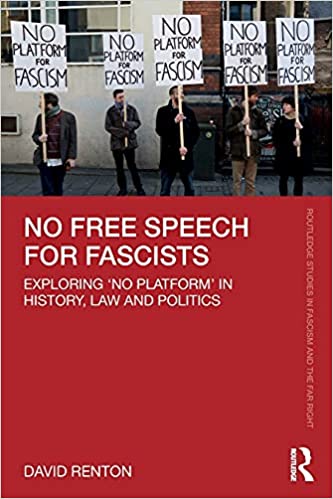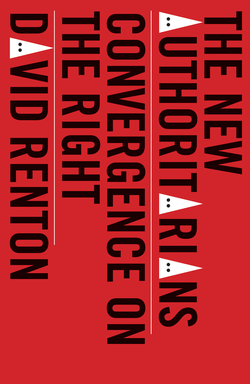The growth of the Alt Right, the entrance of Donald Trump to the political stage, and the mass radicalization to conspiracy theories from Q-Anon to Stop the Steal has oriented the country to the type of ideas, and activism, that most pleasant middle class families had left to other people. Antifa became a catchall for the growing militant left, and for good reason: there was a fight happening in the streets, one fighting the potential of a fascist movement in utero. The political conditions had changed as the edges of the GOP became a welcome space for white nationalists and their allies, which meant that the target of antifascist activists became more pluralistic and diverse. A lot of people were now meeting Antifa.
And this also brought another phrase into the lexicon: No Platform. The term began to be used by the International Marxist Group in 1974 and was heavily drawn into the campus left. Now No Platform usually means disallowing an event by a far-right speaker, disrupting it, overwhelming its space, even using physical confrontation with its organizers. All of this is to suggest that some types of movements, such as openly genocidal white supremacist ones, are beyond the realm of debate since their speech is a form of organizing. If the left provides them an opportunity to organize, it is an opportunity to reach their goals, and so the tactic of “no platforming” someone is to target their very right to engage in an open forum.
Understandably, this has caused a great deal of controversy, particularly as the targets of antifascists have grown as the far-right has, extending into the more normalized Republican venues as the far-right gains a foothold. College campuses and young people are regularly demonized as robbing the “free speech” of “conservatives,” rarely portraying the long history of these community organizing tactics, the actual potential of these far-right figures, and the defensible logic that underskirts No Platforming.
This does not mean, however, that No Platforming is a blanket tactic for any and all situations, and this is part of the hard discussion that happens inside of antifascist circles. Who should be debated, who should be protested, and who should be No Platformed? David Renton is one of the most established writers of antifascist history who comes out of the tradition himself as a decades long organizer in England’s radical left. He tackles this question head on in his new book No Free Speech for Fascists: Exploring ‘No Platform’ in History, Law and Politics. He draws out a debate that is often held in private organizing meetings, trying to establish a metric for when No Platform tactics should be used and what the consequences are if they are used both too sparingly and too liberally.
We discuss this history, talk about what concepts like “free speech” and No Platform actually mean, and what role disrupting far-right speech has in building a larger movement against hate and for collective liberation.
Shane Burley: Where did the idea for this book, No Free Speech for Fascists, come from?

David Renton: A lot of it was a frustration with certain activist experiences that I was having again and again. I’ve been involved in anti-fascist organising for thirty years. So I’ve come through a whole set of left experiences. And I found that there was this disconnect between my training and what younger activists thought. Most of the time, when that happens, the right thing is to go with the younger activists. But in some of these debates that didn’t feel quite right.
Two years ago I was doing a talk at the School of Oriental and African Studies. It’s the most radical campus, the best organized, with a proud history of pro-Palestinian activism: like CUNY I guess in the United States. The students asked me to speak to them, and what they wanted the meeting to do was vote to sack this lecturer who was also an elected politician in a right-wing and anti-immigrant party, the Alternative für Deutschland (AfD), and they were just shocked to find out he was from that party. There were two things that I didn’t really like from this. The first was that everyone in the room wanted to call him a Nazi. These were people I worked with for years, really impressive activists, great people, all calling him a Nazi. But as far as I could tell from what people were saying about him he wasn’t a Nazi. In American terms he is what people used to call a libertarian, and he has not flipped over from shrinking the state and building free-market capitalism to wanting to jail everyone who disagreed with him. He’s not a Nazi.
I talked to a friend who was one of the organizers and I said, what’s the plan? Have you got to the point where you’ve got, say, 5,000 students signing the petition? Because I want to know how serious it is. He says, no, not 5,000. All right, well, you got 2000? No. You got 500? No. Well, how many people in this room have signed the petition? And he says, 12. But then says “it’s alright because we’ve spoken to the University Vice Chancellor because he’s agreed to meet us.” And this just left me screaming inside because whose power would that be building? How does this make our side stronger? You’re just giving the University more of an excuse to look around, look at their employee list, and say “well we sacked this one far-right guy and there are a lot of far-left people here, let’s go after them next to make it look balanced.” The students were going into a battle without any coherent or principled politics to navigate through it.
In a way it is sort of a question of whether or not there is any kind of mass participation or agreement in the organizing of this issue, or which tactic is appropriate in this case. It also seems to be a part of the question of antifascist strategy: is it better to have a non-mass militant approach, where disruption by a small cadre of well trained organizers is best in a given situation, or if it is more effective to rely on a mass action of hundreds or thousands of people to shut down a far-right figure or group.
I’m not trying to say that militant antifascism is always wrong and mass antifascism is always the right tactic. Sometimes the fascist groups are really small numbers of people. And I wouldn’t be so daft as to say, “Look, there’s ten fascists on the other side, we can’t do anything unless we’ve got 2000 people to stop them.”
Which of the tactics works best depends on the enemy you’re facing. One of my first bits of research on antifascism years ago — my Phd — was on the 43 Group (a largely Jewish militant antifascist group in Britain that fought fascist leader Oswald Mosley), which was really effective when there weren’t that many supporters of Mosley and physical disruption by a small number of committed people was effective. But once Mosley’s group reached a certain point the 43 Group wasn’t capable of taking them down and the movement had to turn to mass activism.
So I’m not trying to say that for antifascists it is all about mass organizing. But what I am saying is the move towards more militant tactics becomes legitimate at the moment when your enemy is clearly fascist. The more your enemy drifts away from open fascism, the more you should be cautious about taking militant action.
Let me give you an example. Think about the punch on inauguration day. When one person punched Richard Spencer on Trump’s inauguration day in 2017, that was great. But what if that one guy punched Donald Trump? I don’t think that would work because not everyone watching it would say “Donald Trump is a Nazi, he deserved it.” Instead, large parts of the country would say, “Donald Trump just won the election. We voted for him.” And no one would have bought it. So it’s alright to go militant, but it’s alright to go militant because you’ve got a clearly fascist enemy. The more your enemies are right-wing populists, the more you should be ringing that alarm bell inside your mind rather than just going straight to militant tactics.
The question is at what point the “no platform” militant antifascist tactics become logical for organizers, and you seem to place it about when the figure or group being discussed is a fascist movement who hinges their ideology, goals, and tactics on violence.
I try to hinge the use of militant tactics on whether or not someone is an actual fascist, but the practical reality is it is sometimes quite hard to tell when something’s fascist. Your enemy might be far-right and moving towards fascism, or far-right and moving away from fascism, and there are some quite gray topics and situations. I think when your enemy is using political violence is the moment when people understand why no platform makes sense as a tactic.
But I do think you have to mean fascist-style violence. I was doing a talk the other day and people kept going back to the incident in 2017 when antifascists shut down Milo Yiannoupoulos at the University of California at Berkeley. People were saying that isn’t it violence when Milo is threatening to out our people? Isn’t that violence?
I think I mean fascist violence in a more coherent way than that. It’s a more systematic use of violence. There is a certain distinct way that fascists used violence in the 1920s and 1930s — they would go after left-wing newspapers and unions and halls, and Jewish politicians and they would try to militarily defeat them one by one, killing the people involved if that was what was needed and smashing any left organisation til there was nothing left.
So someone like Richard Spencer, who is a fascist by anyone’s definition, has an incredibly coherent and clear fascist politics. And at the same time, he, for at least his early years, argued against political violence as a tactic and instead for a focus on meta-politics, and even actual politics or community organizing (this has been taken up by others at places like Counter-Currents). This, of course, is not to say that he was not ideologically violent or that his politics didn’t imply violence, but he was not arguing for violence as a primary tactic. But even without the up front violence, his fascist politics were absolutely clear.
And then on the other hand, you have the Proud Boys, who when interviewed actually answer questions in such a coded way that they sound like beltway conservatives or Republicans. But, their behavior is a systematic and tactical violence in a mass way.
So in this equation, which ones get deplatformed? The open white supremacist holding conferences, or the Proud Boy who parrots GOP talking points and then sets out on a violent spree?
I don’t have a problem with deplatforming either. With the Proud Boys you can say that they use violence in a certain way, and they’ve done it repeatedly. Sometimes I think about how you would put together a leaflet (I’m old school, maybe today it would be a Facebook Page), and you put on the flier five things that the target has done to explain why they should be opposed. And you can come up with five things really easily, so it makes sense. They’re not exactly the fascists of the interwar years, but their use of violence is similar enough.
Spencer is a much more ideological figure. Early on, he was trying to attach himself to a group of thinkers in France who were to some extent moving away from fascism. The political expression of the ideological space they carved out was the Rassemblement National, and they were providing the early ideological legwork for that party, towards a kind of electoral and “post-fascist” populism. So maybe you could say that he was very slowly moving away from fascism, but then you can look at what he did after Trump got elected, the fashy haircut, the “Hail Trump,” that’s the period when he feels like he’s clearly a fascist. And then, after that, you get Unite the Right. After Charlottesville, you can legitimately use No Platform without needing to pause or think: Spencer has shown by his actions that he’s trying to take control of the streets in a way that is reminiscent of the 1930s.

Where do you see the problem is with No Platform being applied more liberally to far-right figures on a wider spectrum?
In an older book, The New Authoritarians, I argued there was a process of a tactical alliance — “convergence” — between the far right and the center right, and it was this which gave the right the energy to grow after the 2008 economic crisis. What I was trying to explain is why in countries around the world, the Right is doing well and the Left is doing badly, and one way to look at that is that the Right has been capable of that kind of alliance, and the Left hasn’t. Very few people have tried to have that kind of alliance between the center left and people further to the left — you’d say Syriza, briefly, in Britain, Sanders, Corbyn. They got smashed by Clinton and the Labour right and that project of convergence on the left didn’t happen.
One of the places the far right and the center right are able to work together is in this use of the idea of “free speech.” It is the key to that relationship. In Britain we have a bill going through parliament that will go through, and it will make it so that anytime a university turns down a speaking event by any group or person, anyone in Britain (they don’t need to be in the same town or even a student) can sue for damages claiming that the university did not protect “free speech.” If you read the government’s justification for it, all the examples they give are really isolated individuals on the far-right who weren’t allowed a platform. We don’t have a far-right government, we have a center-right government, we don’t have a Donald Trump figure (we only have a very weak imitation of Trump in Boris Johnson). UKIP has disappeared. Brexit’s disappeared. The street far-right has vanished. But even still, the center right government realizes that its electoral success rests in creating political opportunities for the very dormant far-right. That is central to their legislative program. They are looking at what is happening in the United States and saying “how can we copy that?”
So if you are just a Republican at a university in the U.S., you could ask, say, a Republican speaker for one of your events. But no one would come. But, if you invite one of these far-right celebrities to speak, Milo a few years ago or Tucker Carlson now, suddenly you have ten times the number of people in the audience. You might be a very boring mainstream member of the center-right, but your relationship with the far right makes you seem fresh and exciting. And “free speech” helps this process. In a context where that is working for the right repeatedly, it’s a tactical mistake for us to go too far and take away these platforms. When we do it badly, when people don’t understand why we’re doing it, all we do is cement the relationship between the two halves of the right and make them look like they’re under attack.
How do you think the Left can reclaim “free speech” as a concept? For example, there are all these bills going through the U.S. trying to ban “critical race theory.” (In some cases, it is just any teaching on racism that could make students, or their parents, uncomfortable.) That’s as clear of an attack on “free speech” as you could ever find. So how can the Left make “free speech” their issue again?
I do think we have to use the term “free speech” again. I think we need to wrestle it back from the right. Let me give you an example. Another writing project I am working on is looking at the British socialist atheist left in the 1840s and 1850s. I started reading John Sturt Mill’s correspondence around the time he wrote “On Liberty.” If you were just some person who went to university in the U.S. and picked up that Mill is the philosopher of “free speech” you would just assume he was some kind of right-wing figure, that most of his allies were conservatives or further to the right, and that’s why he was keen on “free speech” — for them. But if you read John Stuart Mill, and this is his private correspondence, he called it his “infidel” book. Because, in his head, the liberty of the people he was protecting was the liberty of communists, anarchists, the atheists in Britain who had recently been jailed for blasphemy, and the way that conservatives are using “free speech” today would have seemed utterly bizarre to him.
So if you are someone who writes in the CRT tradition, you should be saying — I want to be allowed a platform. I’m entitled to a platform. I demand it. You should say to the conservatives, aren’t you in favour of “free speech”? Well this is my “free speech”.
On the left, we have lost that habit. We have decided that “free speech” is an ideological slogan we can’t use. And I think that is a mistake.
You can combine an argument for “free speech” with No Platform. They are coherent and they work together as long as “no platform” is clearly defined and has no “mission creep.” If No Platform is a strategy only for fascists and those immediately beside them, then it is a limited exception to “free speech” which should otherwise be supported.
When we put it like that, we can show that it’s the center-right and far-right that don’t like “free speech” since they want to ban anything that moves. Just think of all the bills about BDS [The Boycott, Divestment, and Sanctions on Israel campaign in solidarity with Palestinians], or the criticism of writers in the UK who speak out about the legacy of empire or their counterparts in the US who write about slavery. The right are trying to outlaw that kind of speech. You can’t be in favor of “free speech” and then try to ban all the things the right wants to ban.
It seems like “free speech” on the left is understood as simply a proxy. So on campus, “free speech” is actually a proxy for student control of their campus, such as where their tuition dollars are going, or an effort to have control over their own curriculum. So that’s a proxy argument and all of them seem like proxy arguments based on the notion that “free speech” is a farce, that our democratic system of government is a neutral arbiter of human rights, which is something that people no longer believe. Do you think that there is a value in refusing to assume that “free speech” is not a true and valuable concept on its own and instead a pathway to a different type of issue? Or should the left be fighting for “free speech” as a concept and value in its own right?
I think when something’s been used as a proxy for a really long time, it takes quite a big effort of political will to try and use it differently. It seems a bit shocking and strange: why would anyone do that? But if you don’t, there’s a problem.
You say that in the US students are trying to control their campuses — well, good — because what I’m arguing for is a break with the idea that who gets to decide which speech is free are courts, university administrators, and other authorities.
When Milo went to Berkeley, he knew what he was doing. He has this great weapon, which is simple rhetoric and the language of “free speech”. He says, “you’re afraid to use this anymore, so I’m going to co-opt it and steal it.” What he was doing, just as cultural politics, was sharp. We must claim that back. We shouldn’t let them get away with that. The wrong response to that move is to say “Ok, fair point, we’re never going to get ‘free speech.’ It’s always a corrupt concept. We’re just going to shut up about it because we are never going to get that concept back.” I think the more confident move, the sign of movements that have a higher ceiling, would be to say “No, we’re going to make “free speech” work for us.”
So an argument, often coming from the center or liberals, is that when you shut down the far-right, it makes them look sympathetic and like underdogs. But the counter-argument to this from antifascists, which I think is generally correct, is that when the far-right is shut down they really can’t make the argument that they are victims because they don’t have the ability to make any argument because they are unseen. That when they are disrupted they lack their ability to draw in sympathy because they have no infrastructure to actually do that. That shutting them down cuts their ability to win, both organizationally and rhetorically, because their victory depends on them having a platform of some kind from which to make those organizational and rhetorical attempts.
I really don’t think that it’s always the case that shutting down either works or doesn’t work. I give loads of examples in the book of it going either way. Right about the same time that Milo’s Berkley event gets shut down, his career gets canceled more generally and now he’s going nowhere. So you could use that as an example of a non-fascist far right speaker who gets no platformed and it defeats him. But at the exact same time, in Britain, you have Tommy Robinson. Taking away his Twitter account doesn’t silence him, because everyone else on the far right lends their platforms to him. He brings tens of thousands of people onto the streets. His account gets taken down and he then builds the largest far-right movement in British history. The same method leads to completely opposite results. So we need to get away from the idea that any method is guaranteed for success or guaranteed for failure. The methods work, or fail, in a much more context-specific way.
Even Milo, I think if you stopped the camera after Milo’s first attempt to go to Berkeley, I think you could say it did well for him. Newspapers were running these stories accusing college students of being insane, saying that they were shutting down “free speech” unfairly. There were articles at a rate of one a week in the New York Post supporting him. So it was creating the dynamic that Milo wanted. There were other reasons that his section of the far-right in the United States was reaching a limit at that point anyway. For example, his appearances were not that long after Charlottesville. And Milo was going to be headed for a fall anyway.
Although the conversation that keeps getting presented is a debate between people in favour of letting these events go on or closing them down, what I am trying to say is that no platform or “free speech” is partly about where you cross the boundary (fascist or not) and also partially about the scale of the mass movements on our side.
If your enemy is seen as far-right to the point of fascism, then you can get away with these no platform tactics. If your enemy is seen as moving in the populist direction and gaining in popular support, then those tactics do not work as well. It’s not just whether they are fascists, it’s also about our numbers and how large the forces are trying to shut them down.
You are critical of the focus on deplatforming from social media and other tech systems, partially because it gives sole hegemonic power to tech companies to decide who can be on these platforms (which can, of course, then be used against the left and radicals). I think the counter-argument is that by taking mass direct action to pressure the tech companies towards deplatforming, we actually take a certain amount of de facto directly democratic control over the companies (at least to a small degree).
I think there’s something to that approach because the mass movement around BLM was so big that it did have a democratic component. And it was, to a degree, popular pressure that fueled deplatforming. But we are getting away from that moment, now we’re not having the same numbers in the streets. And this idea of deplatforming is hanging around the left, meaning this is where people think they should put their time and energy. At this point, if there was a democratic element to it a year ago, let’s say, I don’t think there is now. It’s a short cut, and it isn’t delivering any democratic control for us.
So how do you think people should approach these platforms from a social movement space? Particularly understanding that the alt-right isn’t possible without them having access to tech platforms.
What I’m against is people seeing it as an activist priority and putting all their time into deplatorming, or going into it in a naive way thinking that only good things can come from that process. I’m not saying we should complain that Trump has been banned or that we should campaign that Facebook should let him keep his page. But I don’t think we should actively associate ourselves with deplatforming, we shouldn’t put activist time into it and we should have the political savvy to grasp why.
The more you do this, eventually the harder it’s going to be for us when that banning instinct is applied to more impressive social movements. Because the truth is that whenever the left has been a massive social force, we become a threat to capital. The more that deplatforming is normalised, the easier it is for the organizations to use if against us.
This is a sort of the same argument against hate speech laws. Whereby they further enhance the carceral state and then will be manifested in unequal ways because of the inherent stratification and racism in the legal system.
I don’t think there is a meaningful difference whether you are talking about states or about corporations. In both cases, the left should be against them.
But obviously not everyone sees it like that. In Britain, the debate isn’t so much about whether we should have hate speech laws, I mean we’ve had them since the mid-1960s, and the shared feeling on the left and the right is, broadly, that they work.
The issue is much more about whether they should be extended, and to who. From the perspective of young activists, one of our biggest problems is this new phenomenon of anti-trans feminism. It is common sense among young British leftists and pro-trans activists that we should be invoking the Equality Act prohibition on harassment and using that argument for removing the platform of bigoted speakers. So no one is calling for new hate speech laws, but it is generally accepted that hate speech laws should be used more widely. And that the best way to defend the rights of some of the most marginal people is by going to the courts. Now, as a barrister — a trial lawyer — I know the laws that people want to rely on and can see more clearly than other activists their weaknesses. And in this and other writing projects I’m saying that we need to rely on social movements, the numbers they can turn out, rather than to envelop those social movements in the law.
There seems to be a seductive nature to the belief that the state may be unequal most days, but the day that your enemy is in your sights then it becomes useful.
Exactly. I mean, I’m an employment and discrimination lawyer. So five days a week I’m thinking how I can use equality law to save someone’s home or save someone’s job. So when I look at it and say it’s a seductive but bad move, I’m not doing that on the basis of purely philosophical arguments. I’ve got my hands dirty trying to use this stuff. I think I have a realistic idea of how far the judges will go to help our side and where they stop.
I’m involved in these social movements and I see why they use these legal roads. But I also think that part of winning on any serious scale is about subordinating the law and looking to our ability to organise and using our own strength.
Shane Burley is the author of Fascism Today: What It Is and How to End It (AK Press, 2017), and the recently published Why We Fight: Essays on Fascism, Resistance, and Surviving the Apocalypse (AK Press, 2021). His work has appeared in Jacobin, Salon, Truthout, In These Times, Waging Nonviolence, ThinkProgress, Political Research Associates, Alternet, and Roar Magazine.
This post may contain affiliate links.







